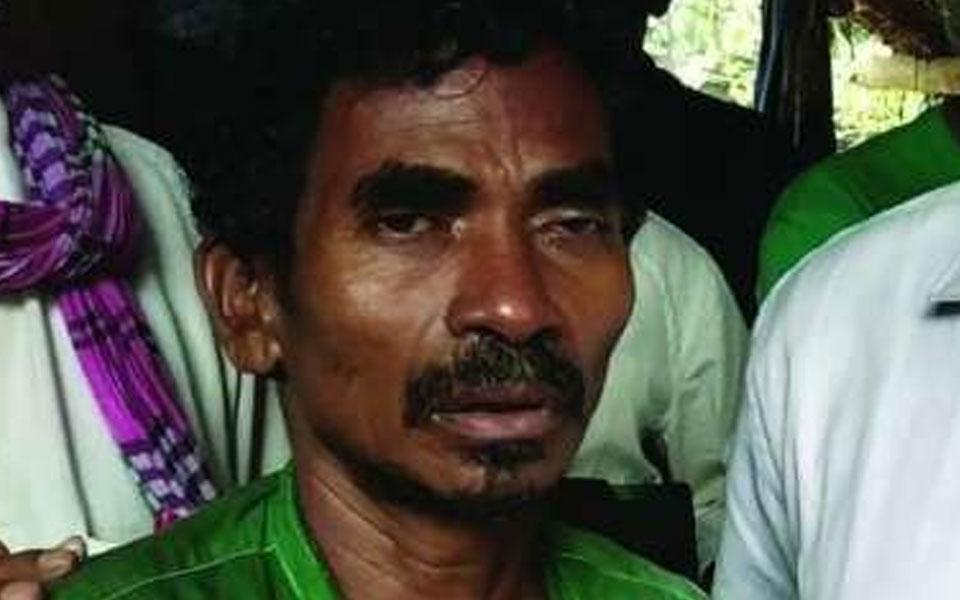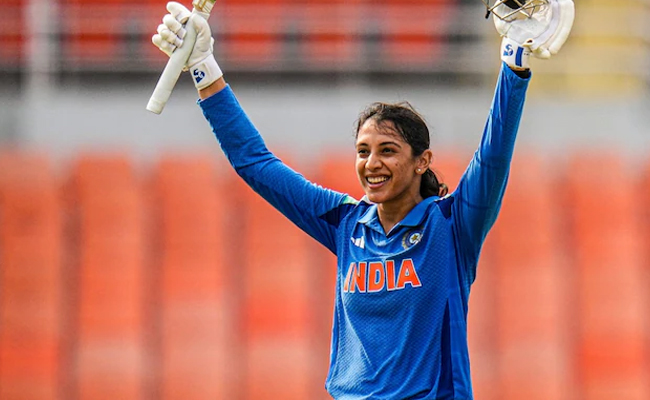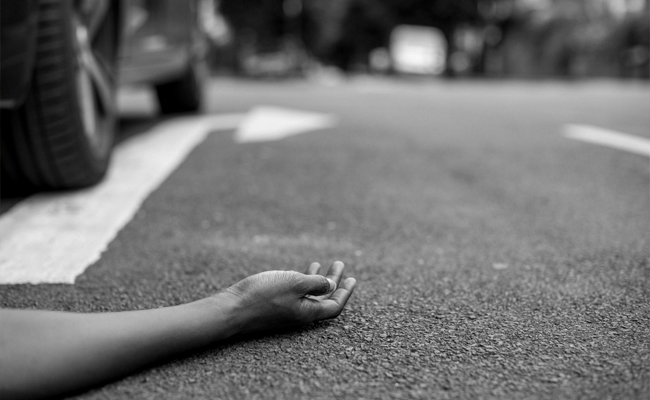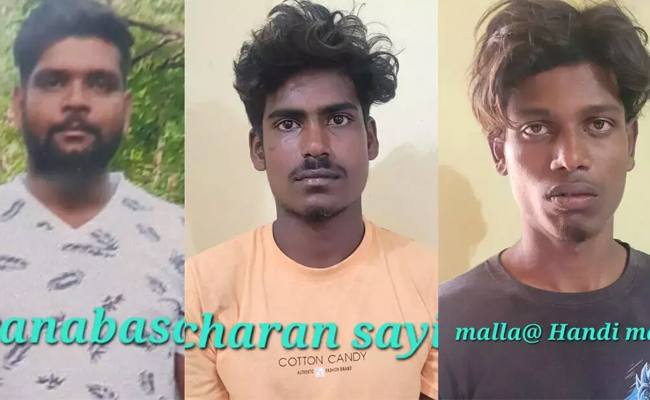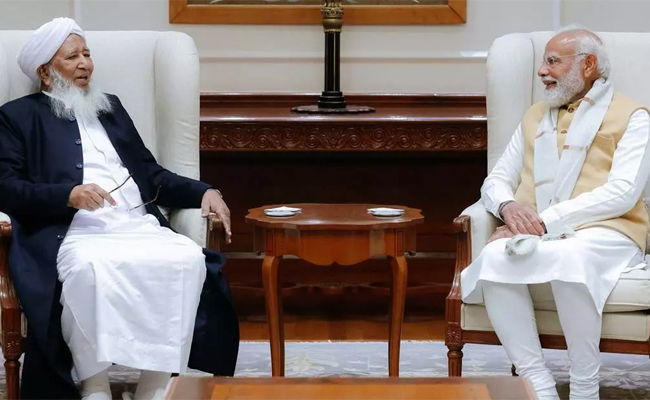Gompad (Chhattisgarh): Muchaki Lakma walked anxiously into the thatch-shelter where we were all assembled, guided by his 12-year-old son, Sukda. He had just returned from Durma, a village some four kilometres away. When he began talking about the August 6 encounter in which the Chhattisgarh police claim to have killed 15 “Maoists”, he broke down and wept inconsolably.
Speaking to a group of rights activists and journalists, he described how his 17-year-old son Muchaki Hidma was gunned down by the police that day along with 14 others at Nulkatong. Hidma was the sole support for the family and now he is gone.
Lakma, a blind man who is dependent on his 12-year-old son for mobility and who is still coming to terms with the death of his elder son, was one of the many who were forced out of their homes by the security forces when they came to know of the anticipated visit of our fact-finding team. Nulkatong’s residents were forced to vacate their homes and told to stay away for three days.
Many of the villagers like Lakma went to Durma, walking for hours through the forest in the incessant drizzle, barely a few days after their kin were gunned down. According to the villagers of Gompad and Nulkatong, they were warned not to speak with the media or to rights groups.
A fact-finding team of 16 people representing various rights organisations – CDRO, Civil Liberties Committees of Andhra Pradesh and Telangana, WSS, PUDR – and journalists visited Gompad and Nulkatong in Chhattisgarh where 15 adivasis were gunned down by the security forces on the morning of August 6, 2018. One of the objectives of the visit was to gather first hand accounts of what exactly had transpired. A PIL in the matter has already been filed by Narayan Rao of the Telangana Civil Liberties Committee and is coming up for hearing in the Supreme Court on August 29.
When the team reached Gompad on the evening of August 18, there was a blanket of fear and silence over the village. On the 19th morning, the victims’ families and survivors were requested to gather at the anganwadi shed to meet the team. Overcoming their initial hesitation, one by one, the victims’ kin and survivors began to come.
According to the villagers, on August 4, a large contingent of security personnel arrived at the village. As is the practice in most of these villages, all the able-bodied men left the village for the khetas – makeshift shelters near their fields – or to their relatives in nearby villages. Some of them went to Nulkatong to their relatives, where they ate and went to the kheta near the fields to sleep. Other than Gompad, villagers from Velpocha, Etegatta and Kindrelpad were also at the kheta near Nulkatong that day.
Some of them from Gompad came back on August 5 only to find that the security forces were still around and so went back to the kheta. On August 6, at day-break, around 6 am, the security men surrounded the kheta near Nulkatong where some 30 adivasis were sleeping and began to fire, the villagers say.
Soyam Chandra, aged 21, tried to identify himself as a panchayat member but got shot anyway. As people began to run helter-skelter, Kadti Aitha, a 12-year-old boy, got shot and his father, Kadti Sukka, got wounded on his leg as a bullet grazed him. Aitha along with Soyam Sita, Kadti Aima, Madvi Nanda from Gompad, Sodi Prabhu, Madkam Tiku, Tati Hunga, Muchaki Hidma, Muchaki Deva, Muchaki Muka of Nulkatong, Vanjam Hunga of Velpocha, Madi Hunga of Kindermal and Madvi Bama of Etigatta all fell to the bullets. Of these, some six victims were minors, according to their families.

(The grave of Kadti Aitha (inset), who was 12 years old, with his school bag.)
Kadti Aitha, the 12-year-old, was studying in class three at the Konta government school. Poignantly, the villagers have placed his school bag on his grave. These villages have no access to school, or medical facilities. The villages are not connected by even a tractor track. In the monsoon, even the few tractor tracks become impossible to negotiate. For everything they have to walk some 20 km to Konta through the forest.
In Nulkatong, there are five bore-wells but only one works. The anganwadi worker comes every Thursday, and sometimes stays for a week. A school that was started in 2002-03 shut down in 2007-08. In 2006, the Salwa Judum burnt down all the houses and Muchaki Boti died. Now his son, Muka, was shot dead in this incident.
The villagers narrate a familiar story of the security forces entering the villages and as the men run away, taking over empty houses, cooking and consuming rice, poultry and goats belonging to the villagers, and causing terror with their abusive behaviour. During the Salwa Judum times, entire families would leave their homes, only to find all their food and poultry consumed and houses set on fire. To be caught by the Judum men would mean sure death.
Now only the men leave, but the security personnel still intrude and consume whatever the house-holds have while threatening the families. As a young man told us in frustration, “The earlier state police force was much better. The SPO and DRG that have come up now kill, torture ruthlessly and indiscriminately. They also target anyone – students, farmers, social workers … anyone.”
The victims’ kin told us that they heard gunshots in the morning and rushed to the kheta where their people were sleeping. The security men shooed them away and refused to allow them near the bodies.
The Hindustan Times quoted the special director general (anti-Naxal operations) D.M. Awasthi, as saying, “The encounter started at around 6.30 am when a team of District Reserve Guard (DRG), Special Task Force (STF), Central Reserve Police Force (CRPF) conducted the operation following a a specific intelligence input about the Maoist camp in Nalktong village in South Sukma.”
The families went to the Konta hospital where they were told that the bodies were taken to Sukma for post-mortem. After the post-mortem, the bodies were brought up to Bonda and left there. The families were left to find ways of getting the bodies back to their villages.
Gompad village has been a repeat target of the Salwa Judum and now DRG/SPOs. Sodi Sambo’s case is from the same village. Sambo no longer lives there. Madkam Hidme whose body was exhumed for re-post-mortem under Chhattisgarh high court orders, was also from Gompad. Much like the 2009 Singaram village “encounter” in which 13 bodies were subjected to post-mortem under court orders, Hidme’s case also has not come up for hearing for unknown reasons, even after the court-ordered post-mortems were done.
Soni Sori, the social activist, who was at Nulkatong during the fact-finding team’s visit, expressed distress at the repeated assaults and brutalisation of her community and the diminishing hope for justice.
Sori had conducted a tiranga yatra last year, taking the message of the constitution and the tricolour to these villages. However, she was taken aback this time when Madkam Hidme’s mother, Lakshmi, handed her back a neatly folded flag, saying that it has failed to protect her people and to provide justice.
courtesy : thewire.in
Let the Truth be known. If you read VB and like VB, please be a VB Supporter and Help us deliver the Truth to one and all.
New Delhi (PTI): Star batter Smriti Mandhana, who played a pivotal role in India's historic 2025 Women's World Cup triumph, was named the BBC Indian Sportswoman of the Year for 2025 at a glittering function here on Monday.
Chess prodigy Divya Deshmukh won the Emerging Player of the Year award, for her historic FIDE Women's World Cup triumph at just 20.
Preethi Pal was named the Para-Sportswoman of the Year, for winning two bronze medals at the 2024 Paris Paralympics in track and field, while Anjali Bhagwat was honoured with the Lifetime Achievement Award, recognising her pioneering career as India's first woman shooter to reach an Olympic final and her trailblazing success on the world stage.
Mandhana, who is currently touring Australia with the Indian team for multi-format bilateral assignments, said in a video message: "Thank you BBC for giving me the awardfor Best Sportswoman of the Year. 2025 was a special year for women's cricket, especiallytowards the end we had a World Cup and I'm happy I could contribute and help India win matches.".
At 29, the left-handed batter is already among the game's greats, with the second-highest number of centuries in women's One Day Internationals and ranking third in total runsscored among current players worldwide.
Hailing from Sangli city in Maharashtra, the affable Mandhana was inspired by her father and brother, both of whom played cricket at the district level.
In September last year, she made a 50-ball hundred against Australia – the fastest 50 over international ton (men and women) by an Indian in the format, breaking Virat Kohli's record.
The award winners were decided by a distinguished grand jury comprising Leander Paes, Deepa Malik, and Anju Bobby George.
Praising the athletes' achievements CEO of BBC News, Jonathan Munro said: "Congratulations to this year's winners who showcase the very best in sporting excellence. The BBC World Service is committed to bringing such stories of human endeavour and outstanding success to audiences across India and around the world.".
Additionally, the ceremony also celebrated a wide spectrum of talent and impact, recognizing star performers and changemakers for redefining the landscape of Indian sport.
BBC Star Performers of the Year 202.
• Indian Women's Cricket Team: for their historic World Cup victory.
• Ekta Bhyan, Deepthi Jeevanji and Preethi Pal: for their trailblazing performances at the World Para Athletics Championship.
• Indian Women's Cricket Team for the Blind: for their inspiring World Cup victory.
• Indian Women's Kabaddi Team: for their smashing victory in World Cup.
.
BBC Changemakers of the Year 202.
• Indian Women's Ice Hockey Team: for breaking barriers in a non-traditional sport.
• Rajbir Kaur: Indian field hockey player and former captain of the women’s national team.
• Savita Punia: Indian field hockey player and current member of the national team.
• Paani Devi: recognised for her impactful contribution to grassroots sport.

